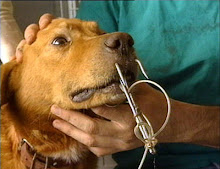Watchdog Group: Charity Navigator Downgrades Humane Society of the United States Ranking
Richest Animal Rights Group Now Ranked Lower Than PETA
Today the nonprofit Center for Consumer Freedom (CCF) pointed to a newly downgraded rating from Charity Navigator as evidence that the Humane Society of the United States (HSUS) is not adequately fulfilling its stated charitable purpose. On Thursday Charity Navigator slashed the rankings for HSUS and the Humane Society International, the international arm of HSUS.
Charity Navigator now gives HSUS a lower level of trustworthiness than the notoriously radical People for the Ethical Treatment of Animals (PETA). The American Institute of Philanthropy also rates HSUS very critically, giving the organization a "C-minus" grade overall.
HSUS's 2008 tax filing shows that the group spent less than one percent of its collected donations on grants to hands-on pet shelters. It put five times as much into its executive pension plan during that year.
David Martosko, CCF's Director of Research and the editor of HumaneWatch.org, released the following statement on HSUS's new ranking:
Charity Navigator's downgrading of the Humane Society of the United States and its international arm sends a clear message: Animal charities can't stuff donor dollars away in pension plans, shortchange pet shelters, and expect that no one will notice.
HSUS raises tens of millions of dollars a year from Americans who believe their money is trickling down to local pet shelters. Instead, their contributions fund a bloated staff of well-paid lawyers and lobbyists, PETA-style propaganda campaigns, and a hefty executive pension plan.
For more information, visit HumaneWatch.org. To arrange an interview, please call Allison Miller at 202.463.7112.
The Center for Consumer Freedom is a nonprofit watchdog organization that informs the public about the activities of tax-exempt activist groups. It is supported by American consumers, business organizations, and foundations.
SOURCE Center for Consumer Freedom
Subscribe to:
Post Comments (Atom)

















3 comments:
Hi Dogman - I work at the HSUS and would like to address this press release from the Center for Consumer Freedom. The HSUS has received the top rating (four stars) from Charity Navigator for four of the past five years. This year's three-star rating was based on our 2008 financial assessments and came because the HSUS intentionally reduced its program costs, as a percentage of total expenditures, from 83% to 72%, and increased its fundraising costs as a percentage of total expenditures from 14% to 24%, in accordance with the guidelines of the Better Business Bureau.
The three-star rating, according to Charity Navigator, means that the HSUS “exceeds or meets industry standards and performs as well as or better than most charities in its cause.”
The HSUS also meets all standards of the Better Business Bureau Wise Giving Alliance, and was recently named by Worth magazine as one of the nation’s top ten most fiscally responsible charities.
If there's any doubt about our organizational effectiveness, check out our 2009 accomplishments at www.humanesociety.org/about/overview/2009_accomplishments.html.
At the end of the day, it costs money to raise money, and many of the forces we are fighting (such as industry groups represented by the Center for Consumer Freedom) are well-funded corporate interests who profit from their cruelty to animals.
Thanks for your side of the article Hillary, after looking at HSUS 2008 tax return it overwhelms me to see so much of the income being paid out to salaries and the twenty seven directors sure are making a nice salary. What really strikes me is why it cost four million to process mail at Arizona Lockbox. I just wonder why the support to more local animal shelters isn’t being provided when HSUS receives so much money from people thinking that the money is being used for that purpose. Please don’t get me wrong, I know that HSUS has done many things to help fight animal cruelty and made the public more aware of this. Yes I went over to the Charity Navigator (http://www.charitynavigator.org/index.cfm?bay=search.comments&orgid=3848) and I seen many posts about the waste of funds that are being spent when all that people are asking for is that more funds should be spent on the animals. By the way I didn’t know that HSUS was into the restaurant business.(http://www.qsrmagazine.com/articles/news/story.phtml?id=10026) So now Jack in the Box and Steak 'n Shake has HSUS on their side, too bad the animals in the shelters won’t be able to get a shake. I don’t even care who the Center for Consumer Freedom is, and the post had nothing to do with them. I also stopped over at Wayne Pacelle’s Blog (http://hsus.typepad.com/wayne/humane_society_at_work/)and read his post about CFCF on which it looks like your two companies are having it out in public. Again don’t misunderstand me if you think that the post was to make HSUS look bad, it’s just that the question is why is not more of the funds that are being donated being spent on protecting the animals and help out the animal shelters that are in dire need.
Thanks for your response. I'm not sure if you're aware, but the HSUS isn't affiliated with local animal shelters. Having worked at several shelters myself, I understand the critical role they play. However, the HSUS was founded in 1954 with the specific aim of NOT replicating what is already being done by shelters.
We tackle broader animal cruelty issues that shelters have neither the time nor the resources to address -- for example, puppy mills, dogfighting/cockfighting, factory farming, and lab animal welfare. The animal protection movement is larger than homeless dogs and cats.
By all means, support the shelter(s) that serve your community. My belief is that both types of organizations are necessary to raise the bar for all animals, but I certainly recognize that donors need to establish their own priorities. Thanks for the opportunity to present another side of the story.
Post a Comment